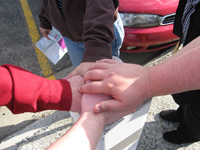October 5, 2010 -- While collaboration among libraries, archives and museums has taken place for some time, challenges remain on the path to success.
This topic generated a great deal of insightful discussion at Yours, Mine, Ours: Leadership Through Collaboration, a recent meeting hosted at the Smithsonian Institution.

Collaboration. Credit:
http://www.flickr.com/photos/fncll/145149313/ (external link)
CC BY 2.0 (external link)
"Collaboration Culture: How to Lead a Successful Multi-institution Collaboration" was one of six Birds-of-a-Feather breakout sessions at the meeting. The breakout aimed to encourage attendees to share experiences and to identify others with similar concerns.
The session was also geared to frame central questions and suggested solutions, comments and ideas for exploration. Bill LeFurgy from the National Digital Information Infrastructure and Preservation Program facilitated the breakout, which had about 40 attendees.
Participants first brainstormed a list of questions, and subsequent voting identified two of particular interest. "How to sustain a successful collaboration" was one of the questions singled out for extended discussion. Attendees had a number of responses, including a recommendation that institutional agendas be frankly recognized to ensure that collaborative alignment was possible. Alignment was also described as dependent on reciprocity, a shared sense of purpose, and mutual compassion and respect.
At least some face-to-face meetings were described as essential to build the trust and social capital needed to carry out successful collaboration. There was consensus that successful partnerships had to offer clear incentives. At the same time, the best collaborators were seen as those driven to it by a twin sense of doing the right thing and faith in full benefits emerging after an initial investment of effort.
The other question drawing detailed discussion was "How to manage uneven power structures within a collaboration." Participants agreed on the need for "honest brokers" to bring institutions together, especially at the start of a partnership activity. Many comments focused on situations involving work between many small organizations and a limited number of larger institutions.
Attendees noted that distance between collaborators was an issue that could lead to marginalization, especially in situations where travel funds were limited. While virtual meetings were seen as useful, the group again emphasized the need for face to face gatherings to promote success.
Issues relating to trust and transparency also arose. Smaller institutions worry that their concerns get overlooked by larger institutions that are looking after their own interests. Larger entities, however, worry that smaller players will take a passive role and have unrealistic expectations about what can be done on their behalf. The group agreed that these dynamics were critically important for collaboration and needed further examination.
The OCLC Research and RLG Partnership planning committee organized the conference, which was an outgrowth of previous OCLC work focusing on the convergence of libraries, archives and museums.
